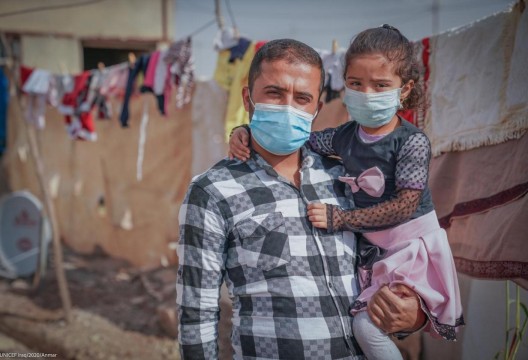
Workers and economic sectors in Iraq have faced uneven impacts from the spread of the coronavirus. Some sectors such as construction and manufacturing, food and agriculture, and wholesale and retail trade were hardly hit by the pandemic.
On the other hand, the working class, a group which makes up to 88% of the labour force in Iraq, was particularly affected. This is because the majority of the working class occupies temporary positions and are employed within informal sectors. These workers are physically able to work and do so for non-governmental entities. As a result of this position, they are not included in any social protection plans offered by the State. This means that 88% of the labour force does not enjoy social protection in Iraq (Aita, 2017).
As part of working class, the service sector, which employs 56% of the workforce, also represents a group that was significantly impacted by the pandemic. Other impacted workers include those in precarious employment in the agriculture sector. This employment group covers 18.6% of the Iraqi workforce, ranking as the fifth largest in the country. Although the private sector was especially struck, the public sector was not unharmed either: all workers in public schools and universities stopped working when classes were suspended, thereby losing salaries (World Bank Group, 2020).
Temporary workers from service companies, workers in the private sector, and daily wage earners alike were laid off. Salaries were suspended in the electricity and water sectors for three consecutive months because of a lack of liquidity. Women were dismissed from their jobs, while some men kept working. The lockdown, suspension of salaries, and the inconsideration of sick leave during lockdown, all contributed to a remarkable increase in unemployment (World Bank Group, 2020). In such a situation, what is the State response?
The State’s attempts to protect vulnerable workers
An emergency committee was formed and announced a series of protective measures that included suspending flights between Iraq and several Asian countries in which the virus was spreading quickly, closing schools and universities, banning gatherings on religious occasions, and reducing working hours in the public sector by 50% Ayman al-Faisal. “The ramifications of Coronavirus in Iraq [Arabic]. Al-Bayan, March 21, 2020. https://www.bayancenter.org/2020/03/5733/.
The Iraqi government also adopted nation-wide plans to mitigate poverty and protect economic rights. The most important of these measures was continuing the distribution of rationed quotas, as well as a two-month emergency grant in addition to several health measures adopted but yet they were still limited.
However, the financial assistance offered to workers via the emergency grant was inadequate in terms of coverage and duration. When it come to the informal sector, workers did not benefit the economic, financial and protective procedures (i.e. direct payment to workers or to employers) that could have enable them to survive the crisis and keep their job. .
Ultimately, the people’s actions demonstrated their disapproval of the government’s handling of the pandemic. Workers started organizing protests calling for an end to the lockdown, stating, “If we don’t die of Corona, we die of hunger.” In addition, workers who could not make ends meet constantly violated the government’s mobility restrictions. In a report published by Norwegian Refugee council shows that ‘59 per cent of calls received by the Iraq Information Centre were about loss of employment or livelihood opportunities due to Covid-19 movement restrictions. Loss of livelihoods and fear of hunger are contributing to what the UN has termed a “mental health crisis”(Gorevan, 2020)[1] turning the workers in the informal sectors as among the most hit, according to our fieldwork.
Root causes of inequalities and weak social policies
Social protection programs that offer financial assistance on a contributory basis are the most common system in the Arab region – including in Iraq. This system is usually applied to workers in the formal sector. Another system is non-contributory financial assistance. This system includes social networks that cover poorer and more vulnerable segments of society, as well as those physically unable to work due to age or health conditions (Khurshid, 2017).
Temporary and informal workers, however, do not fall under either category of these categories, hence their lack of coverage.
The fragility of the State and its inability to monitor the implementation of projects that provide social services such as healthcare, education, and employment led to an increase in poverty rates and the exacerbation of inequality, as by 2020, 57 percent of the Iraqi population live in poverty(Sida, 2020)[2]
Poverty and lack of social protection have been aggravated through the COVID-19 pandemic.
Some recommendations
The pandemic revealed the unpreparedness and inadequacy in the State’s response. Vulnerable groups, including the unemployed and informal workers, have not received proper social protection and are instead in danger of health risks.
The following are policy recommendations to mitigate the impact of the pandemic on vulnerable populations in Iraq:
References
Aita, S., 2017. Informal Labor in the Arab Countries Facts and Rights. Le Cercle des Economistes Arabes. Available at: https://www.economistes-arabes.org/fr/informal-labor-in-the-arab-countries-facts-and-rights-the-full-report-in-english/ [Accessed January 17, 2022].
Gorevan, D., 2020. Downward Spiral: the economic impact of Covid-19 on refugees and displaced people. https://www.nrc.no/globalassets/pdf/reports/nrc_downward-spiral_covid-19_report.pdf
Khurshid, A., Iraq’s social safety nets: the need for reform. In Social protection after the Arab Spring. Available at: https://ipcig.org/pub/eng/PIF40_Social_protection_after_the_Arab_Spring.pdf.
World Bank Group, 2020. Iraq: Structural reforms critically needed to manage a multi-faceted crisis. The World Bank. Available at: https://www.worldbank.org/en/news/press-release/2020/05/04/iraq-structural-reforms-critically-needed-to-manage-a-multi-faceted-crisis.
* The think piece was produced with the support of UNESCO
[1] Gorevan, D., 2020. Downward Spiral: the economic impact of Covid-19 on refugees and displaced people. https://www.nrc.no/globalassets/pdf/reports/nrc_downward-spiral_covid-19_report.pdf
[2] Sida.2020. Multidimensional Poverty Analysis Iraq 2020. https://cdn.sida.se/app/uploads/2020/12/01095835/mdpa-iraq-2020.pdf